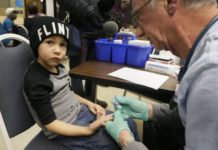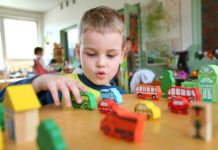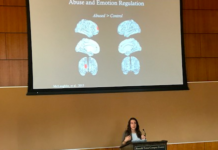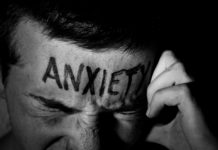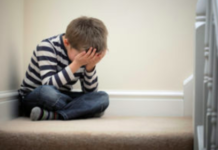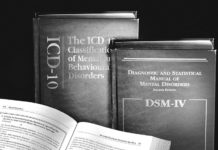Exposure to Family Distress in Childhood Affects Brain Development
Research from the University of East Anglia find that children who experienced chronic, but relatively common, family difficulties - such as arguments, tension, or...
Applied Psychoanalytic Theory in School Settings
In this episode of the Psychoanalytic Voices podcast, Dr. William Sharp discusses his work introducing psychoanalytic techniques into school-based settings.
More Evidence for the Lasting Psychological Impact of Lead Exposure in Childhood
New research points to numerous harmful effects of high-level lead exposure in childhood on adult mental health and personality characteristics.
“Simplifying Childhood May Protect Against Mental Health Issues”
On the Huffington Post, Tracy Gillett discusses Kim John Payne's book, Simplicity Parenting, and wonders if we are overwhelming children with “the burden of too much.”...
“94 Psychiatric Patients in South Africa Died of Negligence, Report Finds”
The New York Times reports on the findings of a South African government investigation that determined that "94 psychiatric patients died of negligence last year after being...
When Does it Help to Have Background Information in Child-Centered Play Therapy?
Knowing the client’s history can help foster genuine empathic responding, a key component to child-centered play therapy.
How Neglect and Abuse Change Children’s Brains
From the Center for Health Journalism: Different types of childhood adversity shape the developing brain in distinct ways and need to be addressed accordingly. While...
“Why Are So Many Children on Antipsychotic Drugs?”
“Do they make people less aggressive? Yes, sometimes they do. Will they sedate people? Absolutely. Will they make kids easier to manage? They will,” Robert Whitaker tells Liz Spikol for Philadelphia Magazine. “But I know of no study that shows that medicating these kids long-term will help them grow up and thrive. The developing brain is a very delicate thing. The narrative is that these side effects are mild, and that’s just not true, and that the benefits are well-established, and so often they’re not.”
“Therapy Wars: The Revenge of Freud”
Writing in The Guardian, Oliver Burkeman discusses the comeback of Freud’s psychoanalysis, along with humanistic therapy, interpersonal therapy, transpersonal therapy, and transactional analysis and...
Is Anxiety to Blame for Missed School?
A new systematic review illustrates features of the relationship between anxiety and school attendance patterns.
Increasing Physical Activity in Schools May Improve Mental Health
A new article suggests integrating physical activity throughout the day may help to address the mental health of students.
Bullying Affects Mental and Physical Health Long-Term
Researchers from Boston Children's Hospital analyzed data from 4297 children surveyed over 3 time points (fifth, seventh and tenth grades) to find that bullying...
Study Explores Sexual and Intimate Partner Violence in College Women with Disabilities
A new study explores sexual violence and intimate partner violence in college women with mental health related disabilities.
“Addiction is a Response to Childhood Suffering: In Depth with Gabor Maté”
Popular addiction news outlet, the fix, interviews Dr. Gabor Maté on addiction, the holocaust, the "disease-prone personality" and the pathology of positive thinking. “Until...
The Importance of Anger: How Anger Management Falls Short
From GoodTherapy.org: A large portion of anger management literature focuses on suggesting ways to tame, control, avoid, reduce, minimize, and even eliminate feelings of anger...
Early Trauma, Social Stress Accompany Psychosis
Researchers at Emory University find that childhood trauma, sensitivity to psychosocial stress and a heightened biological response to stress are associated with the onset...
Individuals With Low Incomes More Likely to Have Chronic Pain
Findings show that participants with lower levels of education and SES suffer from more chronic pain.
“‘Acting Out’ or Suffering from Trauma?”
Eve Troeh and Mallory Falk explore the use of trauma informed curriculum in the New Orleans school system following Hurricane Katrina. “Consider the everyday...
Meta-analysis Links Childhood Trauma to Psychosis Symptoms
The study results suggest that experiences of childhood trauma impact the development of symptoms associated with psychosis.
Philosophers Challenge Psychiatry and its Search for Mechanisms of Disorder
Attempting to locate the mechanisms of psychiatric disorder is a step in the wrong direction and fails to challenge potentially unjust social practices.
Animal Study Supports Influence of Probiotics on Resilience to Stress
Researchers experimenting on mice found that Lactobacillus—the probiotic commonly found in yogurt—may help reduce depressive symptoms in reaction to chronic stressors. But human studies have found mixed results.
“How Poverty Affects Children’s Brains”
New research is investigating how “poverty reduction promotes cognitive and brain development.”
Psychosocial Adversities Should be Included in Diagnosis
Proposal to include psychosocial adversities that impact mental health in ICD and DSM diagnoses.
Chosen Name Use in Transgender Youth Linked to Reduced Depression and Suicide
The ability of transgender youth to use their chosen name is connected to reduced depressive symptoms and suicidal thoughts/behaviors.
Questions About Childhood Trauma And Schizophrenia Settled
In the first analysis of 30 years of studies, including 46 studies (selected from 27,000) involving 80,000 subjects, researchers in the U.K. and Australia...



